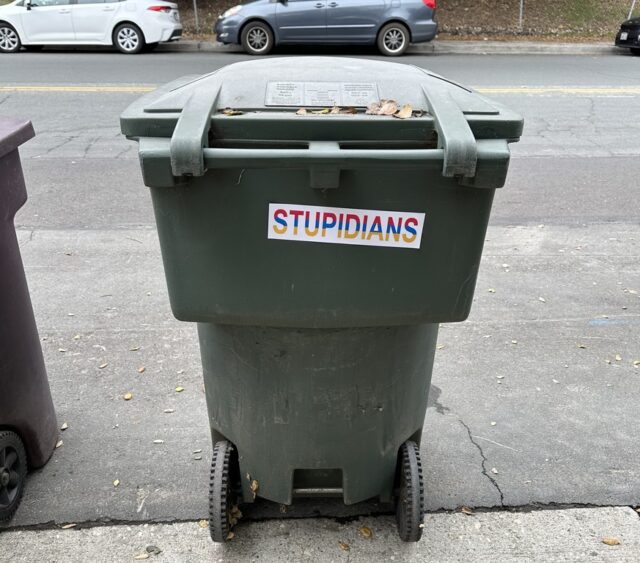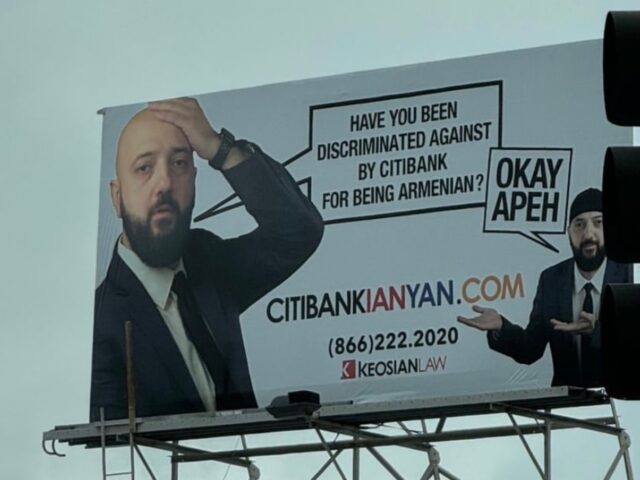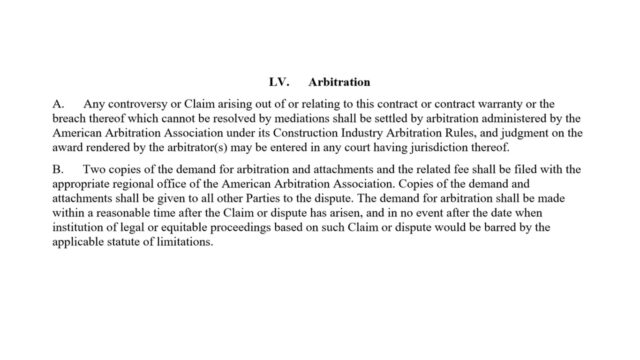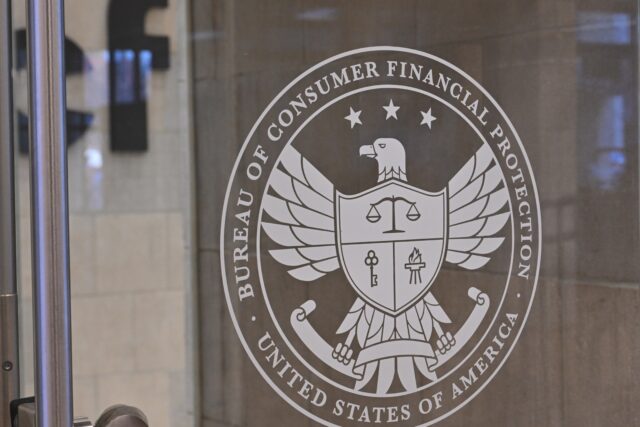Behind the Executive Shield
Citibank’s illegal discrimination against Armenian Americans
Talish Babaian
August 19, 2024
It was trash collection day. With careful steps, my father made his way to the curb, his chest tight from recent stitches. He inched closer to the green trash bin to roll it back onto its wheels and off the street until something caught his eye. As he reached for the plastic handle, he noticed a rectangular sticker pasted onto the bin. The sticker read “Stupidians.” Each letter was filled in with red, blue, and orange—the colors of Armenia’s flag. My father laughed at the sticker. He had seen war and been called far worse. Less amusing was the fact that the man who decided to share that hateful message did so while walking his son to the nearby elementary school, hand in hand.
Armenian last names, like my own, typically end in ian or yan, which simply means “son of,” or “hailing from.” The man who had taken the time to design, print, and paste this sticker was making a point—that we were another one of the many “stupid” Armenian families living in Glendale. The man’s bigoted beliefs and actions were unfortunately not an isolated instant of discrimination.

A photo of the trash bin at my home, taken by Vahe Babaian, my father.
Mary Smbatian received a letter from Citibank in February of 2022, indicating that all of her accounts and cards with Citibank were being closed. No reasons were provided as to why. Smbatian, a mother of five, a loan broker, and a business owner, was forced to open new accounts elsewhere. She ended up taking a hit to her credit score, fought for months to get her own money back from Citibank, and struggled to find her footing after just having birthed her fifth child. After several decades of banking with Citigroup, Smbatian’s ties were entirely severed overnight. “Our whole life was just a mess,” Mary explained. It wasn’t just her funds, it was her reputation, too. Her clients stopped returning her calls, stopped trusting her, and perhaps suspected that something fishy was going on with Mary.
After several decades of banking with Citigroup, Smbatian’s ties were entirely severed overnight. “Our whole life was just a mess,” Mary explained
Alec Anayan experienced something quite similar. Citibank randomly froze his funds entirely, and he was unable to move forward with his business activities for months, losing money along the way. After trying to get in contact with management several times, Alec received notice that his account was closed. The employee at the bank told him that the system didn’t indicate any reason as to why his account was closed, but she did speculate that it was because he was Armenian. She was referring to the stereotype that almost all Armenians commit fraud—namely insurance fraud, loan scams, and credit card fraud.
After speaking with another employee to figure out what had gone wrong, Alec was told, “Imagine you’re an Asian liquor store owner and five black men come in to steal. Once the sixth black man comes in, you won’t let him in. I’m trying to put this in perspective for you.” Meaning, Armenians do fraud so it’s prudent to prevent all Armenians from holding accounts with Citibank. Alec was shocked at the outwardly racist remarks.
The same thing happened to Alina Aramian who was a former Citibank employee herself—back when Citibank was Cal Fed. One day, she received a letter from Citibank indicating that her account would be closed in 30 days. She called customer service and was told there was nothing that could be done. As such, her savings and checking accounts were closed, along with her 401k account, her kids’ savings, and her parents’ savings accounts. Aramian explained, “They made me clear all my history, all my life.”
Finally, the story broke: a Citibank branch responsible for issuing credit cards and loans was purposely denying credit loans and applications to those who had Armenian last names and lived or operated a business in the city of Glendale, California—a city that is home to one of the largest Armenian communities outside of Armenia.
Alex Surenian experienced something similar, too. He began to receive several visits from a “relationship manager” from the bank ahead of all his accounts being closed. The relationship manager would show up unannounced at his office, poking around to look at his furniture and his cars, and asking questions about how he had made all of his money. Alex’s wife wasn’t spared, either. She was denied a Bloomingdales credit card—a Citibank affiliate—despite having a credit score of over 800.
Something similar also happened to Grigor Aslanian, whose SBA loan was denied for no articulated reason. And to Ani Baghdasaryan, and Robert Aghababian, and apparently, thousands of other Armenians whose last names ended in ian or yan. It turns out Citibank had neatly categorized Armenians into a single bin, much in the same way that the man who had stamped my parents’ trash bin had.
Finally, the story broke: a Citibank branch responsible for issuing credit cards and loans was purposely denying credit loans and applications to those who had Armenian last names and lived or operated a business in the city of Glendale, California—a city that is home to one of the largest Armenian communities outside of Armenia. By searching through ian and yan last names, thousands of Armenians were excluded from receiving banking services. They were all categorically labeled as “bad guys” who might have been engaged in fraud.

Photo taken by Talish Babaian in Glendale, California.
The news soon explained that the Consumer Financial Protection Bureau (CFPB) had “found that Citibank purposefully discriminated against applicants of Armenian descent, primarily based on the spelling of their last name,” according to CFPB Director Rohit Chopra. He elaborated, “Citi stereotyped Armenians as prone to crime and fraud. In reality, Citi illegally fabricated documents to cover up its discrimination.” As a result, Citibank was to pay $25.9 million for intentional, illegal discrimination against Armenian Americans—$1.4 million to those who were harmed, along with a $24.5 million penalty. Once the media began to uncover what had occurred, hundreds of Armenian Americans came to realize that perhaps that is what happened to them years back, when their accounts were abruptly closed.
While Citibank’s illegal discrimination against Armenian Americans was personally shocking for many, it was not, on balance, particularly surprising for the community. The banking-scheme that had leaked simply marked another instance of discrimination targeted at the ethnic minority. Armenians living in America have been discriminated against for over a century. It was not until about 1925 that Armenians were considered legally white. In U.S. v. Cartozian, the presiding judge used religion and assimilation as primary drivers for distinguishing Cartozian as “white” and distinct from the other inhabitants of Asia minor. Despite this legal ruling, Armenian Americans, like many other immigrant communities, continued to face discrimination in nearly every facet of their lives.
“Citi stereotyped Armenians as prone to crime and fraud. In reality, Citi illegally fabricated documents to cover up its discrimination.”
As many Armenians immigrated to Fresno, California, they were quickly deemed “Fresno N******.” The humiliation was so mortifying for many Armenian children that they “wished to God they were something else.” Many Armenians went on to change their names in response to this shame: “Baghdassarian became Baxter; Jermagian White; [and] Anoushian Sweet.”





![[F]law School Episode 14: Banking on Discrimination](https://theflaw.org/wp-content/uploads/2025/04/Babaian_FB3-640x427.jpg)





